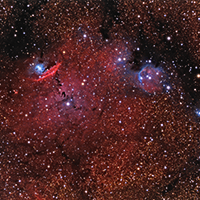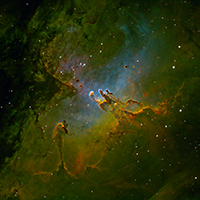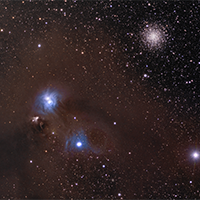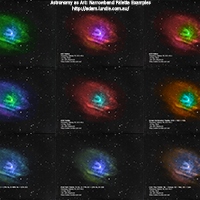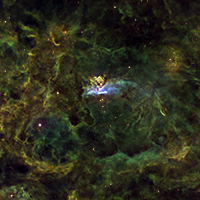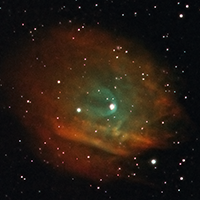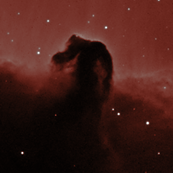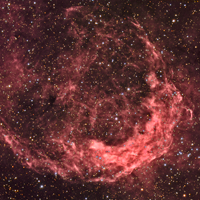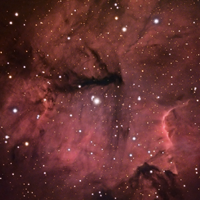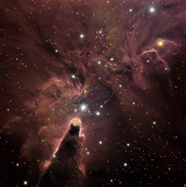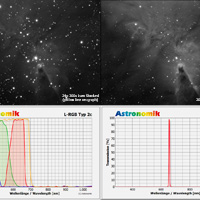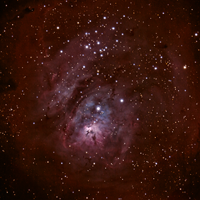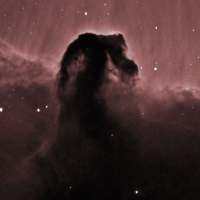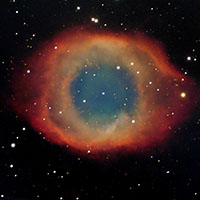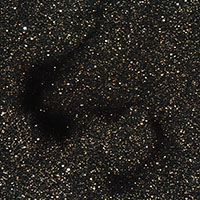Tagged: nebula
09-Aug-2016
Next to the Lagoon Nebula, there lies the often overlooked collection of absorption, reflection and emission nebulae: NGC 6559, IC 1274, IC 1275, IC 4684, IC 4685, Barnard 303, LDN 227, LDN 213, and planetary nebula PN M 1-41.
05-Jul-2016
The Eagle Nebula is located 7000 light years away and is home to the famous "Pillars of Creation", shown in the centre of this image. This photograph is presented in the Hubble narrowband palette, which shows the distrubution of Hydrogen (green), Oxygen (blue), and Sulfur (red) gasses.
26-Jun-2016
Less than 500 light-years away and blocking light from more distant, background stars in the Milky Way, the densest part of the dust cloud of Caldwell 68 is about 8 light-years long. At its tip is a group of reflection nebulae cataloged as NGC 6726, 6727, 6729, and IC 4812. A characteristic blue color is produced as light from hot stars is reflected by the cosmic dust.
16-Jun-2016
Narrowband images are rarely presented as true color light. When imaging in narrowband, colors are assigned to each channel based on the specific emission lines captured. One of the most common choices is the SHO Hubble Pallet, but the choices for mixing colors are endless. Here are 9 examples of how an image of a planetary nebula may be colored.
07-Jun-2016
NGC 6357 is a diffuse nebula in the constellation Scorpius. The nebula contains many proto-stars shielded by dark disks of gas, and young stars wrapped in expanding gases. It is also known as the Lobster Nebula. Presented is a narrowband SHO photograph in the Hubble Space Telescope palette.
10-May-2016
For my first foray into narrowband imaging, I have chosen a very dim & difficult target: planetary nebula Sh2-313, also known as Abell 35 and PK 303+40.1
27-Feb-2016
After switching from a Celestron CGEM DX to a Skywatcher EQ8 Pro, and from off-axis guiding to on-axis guiding I am very happy with the results. This is a 25 minute test shot of the Horsehead Nebula.
13-Feb-2016
NGC 3199 is a hydrogen emission nebula, about 12,000 light-years away. The nebula is about 75 light-years across with a Wolf-Rayet star generating an intense stellar wind in the center of its ring.
22-Jan-2016
Gum 15 is a cloud of hydrogen gas 3,000 light-years from Earth. It is shaped by aggressive winds flowing from the stars within and around it.
13-Jan-2016
The cone's shape comes from a dark absorption nebula consisting of cold molecular hydrogen and dust in front of a faint emission nebula containing hydrogen ionized by the brightest star of NGC 2264. The faint nebula is approximately seven light-years long and is 2,700 light-years away from Earth.
07-Jan-2016
A simple image showing a comparison of visible spectrum and emission line filters in stacked images of the Cone Nebula.
03-Dec-2015
Cloudy nights and full moons gave me a chance to have another look at one of my first deep sky photographs. The first image taken through my telescope that made me say "wow". I decided to try reprocessing the original data with the skills I've learned in the past few months.
11-Nov-2015
I decided to take advantage of the only clear night for over a week to play with some new toys: an Astronomik 6nm Hα filter, and a Starlight Xpress adaptive optics unit. After learning how to calibrate and use the AO, I settled on the Horsehead Nebula as my target.
06-Oct-2015
The Helix Nebula, also known as The Helix, NGC 7293, is a large planetary nebula located in the constellation Aquarius, 695 light years away.
14-Aug-2015
I have only a few nights experience with astrophography, so while I wait for my new camera, I'm using my wife's full frame DSLR. Since it's not so sensitive to emission nebula, I thought I'd try a dark nebula.
